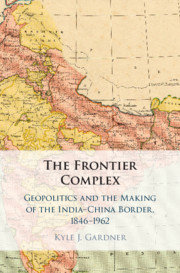Book contents
- The Frontier Complex
- The Frontier Complex
- Copyright page
- Dedication
- Contents
- Figures
- Maps
- Tables
- Additional material
- Preface
- Acknowledgments
- A Note on the Text
- Introduction
- 1 Territory before Borderlines
- 2 Surveys
- 3 Communication
- 4 Reading the Border
- 5 Trans-frontier Men
- 6 The Birth of Geopolitics
- 7 Lines of Control
- Epilogue
- Archives
- Bibliography
- Index
2 - Surveys
Boundary-Making Principles, Mapping, and the Problem with Watersheds
Published online by Cambridge University Press: 21 January 2021
- The Frontier Complex
- The Frontier Complex
- Copyright page
- Dedication
- Contents
- Figures
- Maps
- Tables
- Additional material
- Preface
- Acknowledgments
- A Note on the Text
- Introduction
- 1 Territory before Borderlines
- 2 Surveys
- 3 Communication
- 4 Reading the Border
- 5 Trans-frontier Men
- 6 The Birth of Geopolitics
- 7 Lines of Control
- Epilogue
- Archives
- Bibliography
- Index
Summary
The second chapter draws on material from numerous colonial archives to examine the rationale behind initial British attempts to create a borderline through the northwestern Himalaya. These attempts, taking place as they did in a region where only border points had previously existed, were rooted in efforts to systematically read the landscape and transcribe it onto paper using generalized principles–principles that came to symbolize a growing sense that, for the empire, geography was destiny. The watershed, in particular, emerged as the ideal border-making object. In theory, these general border-making principles were meant to mitigate territorial disputes and to establish clear lines of sovereignty for the empire. But as this chapter shows, the determining and drawing of boundary lines was a task fraught with unexpected divisions and contradictions, both geographical and political. Despite surveys that revealed shifting limits of the Indus watershed, British administrators sought to apply the “water-parting principle” to their desired border through Ladakh and across most of the 1,500-mile long Himalayan range. Their ongoing failure to successfully “border” the Himalaya was primarily the result of ongoing tensions between ideas of natural frontiers and strategic ones–two frontiers ostensibly unified by the logic of the so-called scientific frontier.
Keywords
Information
- Type
- Chapter
- Information
- The Frontier ComplexGeopolitics and the Making of the India-China Border, 1846–1962, pp. 60 - 91Publisher: Cambridge University PressPrint publication year: 2021
